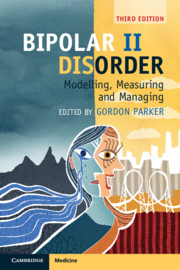Book contents
- Bipolar II Disorder
- Bipolar II Disorder
- Copyright page
- Dedication
- Contents
- Contributors
- Preface to the Third Edition
- Acknowledgements
- Section 1 Domain Chapters
- Section 2 Management Commentaries
- 18 Introduction to Management Commentaries
- 19 Management Commentary
- 20 Management Commentary
- 21 Management Commentary
- 22 Management Commentary
- 23 Management Commentary
- 24 Management Commentary
- 25 Management Commentary
- 26 Management Commentary
- 27 Management Commentary
- 28 Management Commentary
- 29 Management Commentary
- 30 Management Commentary
- 31 Management Commentary
- 32 Management Commentary
- 33 Management commentary
- 34 Management Commentary
- 35 Management Commentary
- 36 Management Commentary
- Section 3 Conclusion
- Index
- References
19 - Management Commentary
from Section 2 - Management Commentaries
Published online by Cambridge University Press: 17 December 2018
- Bipolar II Disorder
- Bipolar II Disorder
- Copyright page
- Dedication
- Contents
- Contributors
- Preface to the Third Edition
- Acknowledgements
- Section 1 Domain Chapters
- Section 2 Management Commentaries
- 18 Introduction to Management Commentaries
- 19 Management Commentary
- 20 Management Commentary
- 21 Management Commentary
- 22 Management Commentary
- 23 Management Commentary
- 24 Management Commentary
- 25 Management Commentary
- 26 Management Commentary
- 27 Management Commentary
- 28 Management Commentary
- 29 Management Commentary
- 30 Management Commentary
- 31 Management Commentary
- 32 Management Commentary
- 33 Management commentary
- 34 Management Commentary
- 35 Management Commentary
- 36 Management Commentary
- Section 3 Conclusion
- Index
- References
- Type
- Chapter
- Information
- Bipolar II DisorderModelling, Measuring and Managing, pp. 213 - 217Publisher: Cambridge University PressPrint publication year: 2019
References
- 1
- Cited by



